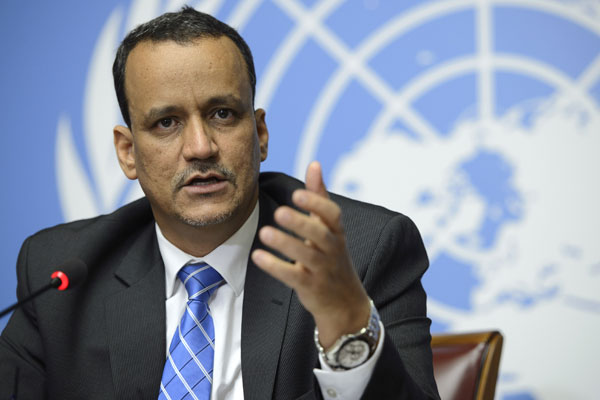
Ahmed ... factions receptive to truce in principle.
Yemen talks end without ceasefire
GENEVA/SANAA, June 20, 2015
UN-sponsored talks in Geneva on a ceasefire between Yemen's warring parties ended on Friday without a deal as Saudi-led warplanes staged further strikes on the dominant Houthi armed faction and allies including elite Republican Guards.
More than 2,800 people have been killed since an Arab alliance began air raids on March 26 to try to roll back the Iranian-backed Houthis' advances across much of Yemen and reinstate exiled President Abd-Rabbu Mansour Hadi.
UN special envoy Ismail Ould Cheikh Ahmed said that in five days of "proximity talks" - in which he shuttled between factions who refused to sit at the same table - the two sides agreed in principle on the need for a ceasefire and withdrawal of forces in keeping with UN Security Council Resolution 2216.
"There is a certain willingness from all the parties to discuss issues around a ceasefire accompanied by withdrawal ... I personally come out from these few days with a certain degree of optimism that we can achieve this (in further consultations) in the coming days," he told a news conference in Geneva.
"The (opposing) positions that as you know have been so strong in view of so many lives having been lost and where a government that is internationally recognised is outside the country. A lot of things didn't make it easy for us."
He said he would fly to New York on Sunday to brief the UN Security Council, where major powers also needed to sign off on his proposal for a force of civilian observers to monitor any truce and withdrawals on the ground.
Hadi's foreign minister, Reyad Yassin Abdullah, said the talks made no significant headway but there was room for more discussions, although no date had been scheduled for any.
"Unfortunately the Houthi delegation did not allow us to really reach all progress as we expected ... But it doesn't mean that we have failed," he told reporters.
Hadi's government has demanded that the Houthis, who are allied with Yemeni military units loyal to former president Ali Abdullah Saleh, pull out of cities captured since last September as a precondition for a ceasefire.
Yahya Duwaid of Saleh's General People's Congress said: "We had reason to be hopeful and optimistic...and we listened to the UN proposals today, but unfortunately, what they were proposing was not of the standard that we were looking for."
Hamza Al-Houthi, head of the Houthi delegation to the talks, put the blame on Saudi Arabia, which is leading the Arab coalition carrying out air strikes in Yemen in support of Hadi.
"We do not say that the Geneva conference failed, but rather that it was a first step, and there were acts of obstruction that were clear and systematic aimed at ensuring that no clear results come out of this conference," Al-Houthi told a news conference on Friday night.
"There is clear and systematic obstruction from the aggressors, at the head of them Saudi Arabia, and this obstruction is aimed at ensuring that the Yemenis don't come out with clear solutions and so that the aggression continues and the siege on the Yemeni people continues,' he said.
The issue of Al Qaeda and its expansion in Yemen had been "completely ignored", Al-Houthi added.
In Washington, US State Department spokesman John Kirby told reporters that the Geneva talks were a useful start. "We have to expect that it could be a lengthy process," he said.
The United Nations on Friday also launched a revised humanitarian appeal of $1.6 billion for the large number of Yemenis trapped or displaced by the conflict.
"Over 21 million people or 80 per cent of the population are now estimated to be in need of some form of humanitarian aid and or protection," UN spokesman Jens Laerke told a news briefing. – Reuters







